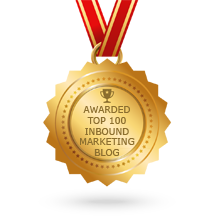
If you run a small business, you’re well aware of the constant work it takes to generate leads, close customers, attract new customers and keep existing ones happy. It’s a perpetual challenge, not made easier by fluctuating economic conditions and changing consumer attitudes. And it’s not doing much for small business confidence.
According to the 2016 MYOB Business Monitor Report, 42 per cent of small business owners believe the economy will dip over the next 12 months, and only 24 per cent are optimistic about it despite pre-election promises of greater support for the sector.
I work with many businesses in this position, and I’m often asked: ‘Can Inbound Marketing really help my business get found and stand out from the competition?’ The simple answer is Yes, it can — and does.

Consider These Statistics From HubSpot
- Buyer Personas made websites 2 - 5 times more effective and easier to use by targeted users
- Personalised emails drive 18 times more revenue than broadcast emails
- Personalised emails improve click-through rates by 14% and conversion rates by 10%.
Need more convincing? In its 2015 State of Inbound report, HubSpot found that:
- Among the 4,000 marketers surveyed, Inbound had a 75% likelihood of being the marketing approach of choice, while outbound had only a 25% chance. This 3:1 ratio remained consistent across all company types (B2B, B2C, and nonprofit).
- Inbound marketing efforts achieve higher ROI than outbound, regardless of company size or total marketing spend.
- In the digital age, companies are shifting their focus to marketing strategies and tactics that can produce quantifiable ROI. Interestingly, every company HubSpot surveyed, regardless of marketing budget, was 3 times as likely to see a higher ROI on Inbound Marketing campaigns than on outbound.
How Exactly Does Inbound Marketing Help Small Businesses Get Found?
Helps You Understand Your Customer
Today people are overwhelmed with content and information. You need to stand out from the competition and find a way to resonate with your buyer at a deeper level.
Developing buyer personas, is a fundamental step within Inbound Marketing, it allows you to paint a deeper picture of the people who are likely to buy from you. Personas provide a deeper understanding of the motivations that are important to customers along the buying process.
Done correctly, buyer personas become the foundation for creating content that connects and engages with people – a connection that can be critical when it’s time for them to choose whose products and services to buy.
It Generates Leads While Reducing Costs
According to HubSpot, 54% more leads are generated by Inbound tactics than traditional paid marketing. 71% of B2B marketers use content marketing to generate leads and 44% of B2B marketers have generated leads via LinkedIn.
It Gets Better
On average, businesses save $20,000 each year by investing more in Inbound Marketing than outbound.
Inbound resolves the traditional conflict between generating more leads and saving money. Businesses can now do both – the statistics don’t lie, and it’s a big reason why organisations of all types have moved to an Inbound Marketing approach.
It Supercharges Your SEO
Inbound Marketing is all about publishing content your audience is looking for. Frequent, helpful and high quality content is something that search engines love, helping to boost your search rankings. For example, a regular blog is a signal to Google of an active, helpful site, which is a key factor in search rankings.
A new blog article, if connected to your website, will be indexed by Google and counted as a new web page. HubSpot research has shown that businesses with more than 400 pages of content generate six times the online leads compared with sites that only feature 50 - 100 pages. Whereas advertising is only useful for as long as you’re willing to pay for it, a well cultivated blog can continue generating leads years after it’s published.
It Builds A Community
The philosophy behind Inbound Marketing is about attracting your customers with valuable content they find useful - not buying their attention or interrupting them through advertising. It places the emphasis on the buyer and their needs, not the business and its sales targets.
This philosophy means truly connecting with prospective buyers and understanding their motivations and pain points - and finding ways to solve them. The ROI isn’t always immediate, but over time it creates a community of ambassadors who are truly engaged with your brand. Regardless of your business type, size or industry, Inbound is a philosophy that has something to offer all of us.
It Positions You And Your Business As An Industry Leader
Inbound Marketing is a platform to share your expertise with the world. It’s an opportunity to offer advice, share information and answer common questions about your industry.
Imagine if a prospective buyer relied on your blog to get the information they needed to perform better at work, or complete a complex task. Already, they are beginning to trust your company and your brand. When they want to enter the sales process, you’ll be their top pick, because they know they can trust your products and services.
By using inbound marketing to achieve these things, you are stating to the world that you are an expert in the field, a leader, and someone who can be trusted.



